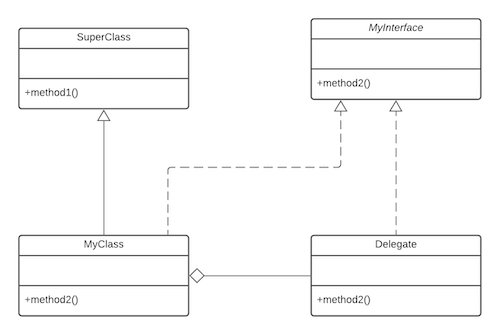Composition vs Inheritance

So how exactly do composition and inheritance compare? Here are several points of comparison:
-
It is easier to change the interface of a back-end class (composition) than a superclass (inheritance). A change to the interface of a back-end class necessitates a change to the front-end class implementation, but not necessarily the front-end interface. Code that depends only on the front-end interface still works, so long as the front-end interface remains the same. By contrast, a change to a superclass's interface can not only ripple down the inheritance hierarchy to subclasses, but can also ripple out to code that uses just the subclass's interface see the fragile base class for an example.
-
It is easier to **change the interface of a front-end class ** (composition) than a subclass (inheritance). Just as superclasses can be fragile, subclasses can be rigid. You can't just change a subclass's interface without making sure the subclass's new interface is compatible with that of its parent (supertypes). For example, you can't add to a subclass a method with the same signature but a different return type as a method inherited from a superclass. Composition, on the other hand, allows you to change the interface of a front-end class without affecting back-end classes.
-
Composition_allows you to delay the creation of back-end objects until (and unless) they are needed, as well as changing the back-end objects dynamically throughout the lifetime of the front-end object. With inheritance, you get the image of the superclass in your subclass object image as soon as the subclass is created, and it remains part of the subclass object throughout the lifetime of the subclass.
-
It is easier to add new subclasses (inheritance) than it is to add new front-end classes (composition), because inheritance comes with polymorphism. If you have a bit of code that relies only on a superclass interface, that code can work with a new subclass without change. This is not true of composition, unless you use composition with interfaces. Used together, composition and abstract (or interface) classes make a very powerful design tool.
-
The explicit method-invocation forwarding (or delegation) approach of composition will often have a performance cost as compared to inheritance's single invocation of an inherited superclass method implementation.
-
With both composition and inheritance, changing the implementation (not the interface) of any class is easy. The ripple effect of implementation changes remain inside the same class.
Choosing between composition and inheritance
So how do all these comparisons between composition and inheritance help you in your designs? Here are a few guidelines that reflect how I tend to select between composition and inheritance.
Make sure inheritance models the is-a relationship. The main guiding philosophy is that inheritance should be used
only when a subclass is-a superclass. For example, an Apple likely is-a Fruit, so I would be inclined to use inheritance.
An important question to ask yourself when you think you have an is-a relationship is whether that is-a relationship
will be constant throughout the lifetime of the application and, with luck, the lifecycle of the code. For example, you might
think that an Employee is-a Person, when really Employee represents a role that a Person plays part of the time.
What if the person becomes unemployed? What if the person is both an Employee and a Supervisor? Such impermanent is-a
relationships should usually be modeled with composition.
Don't use inheritance just to get code reuse If all you really want is to reuse code and there is no is-a relationship in sight, use composition.
Don't use inheritance just to get at polymorphism If all you really want is polymorphism, but there is no natural is-a relationship, use composition with abstract classes.